“It won’t be until 2020 until a state government can have a state plan for raising industrial hemp in their state,” said James Averill, deputy director for MDARD.
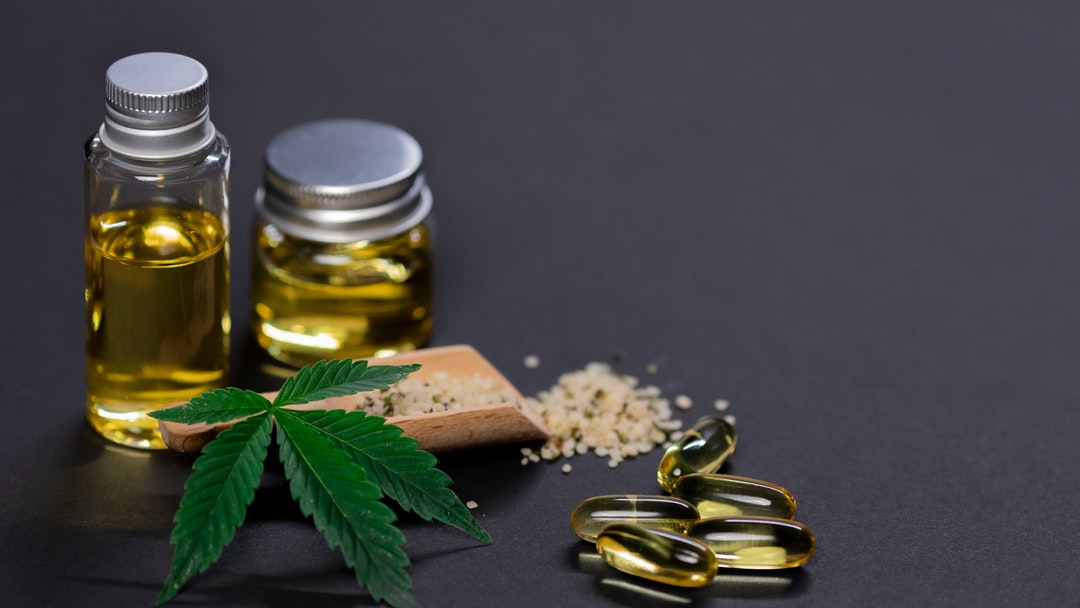
Michigan regulators on Friday, April 15, axed a plan to allow hemp to be synthetically converted to THC, the high-inducing compound in marijuana.
Allowing hemp plants to be converted into oils that produce almost the exact same effects could put those existing producers out of business.
“After receiving a significant amount of public comment regarding safety concerns and the lack of scientific and public health data related to the conversion process outlined in the proposed industrial hemp rules … the Cannabis Regulatory Agency (CRA) has withdrawn this request for rulemaking,” the agency announced Friday.
The decision comes two days after the licensing body was renamed from the Marijuana Regulatory Agency and assumed authority over hemp-derived products. Currently, licensed businesses are permitted to extract THC oil from marijuana.
Michigan Gov. Gretchen Whitmer issued an executive order in February that called for renaming the MRA and assigning it authority over hemp processing for commercial sale. MDARD retains oversight of hemp farming.
Hemp and marijuana are the same plant: cannabis. Except the government defines hemp as cannabis with less than 0.3% THC, the psychoactive compound produced in marijuana at much higher levels. Hemp had been regulated by the Michigan Department of Agriculture and Rural Development (MDARD), and marijuana by Marijuana Regulatory Agency.
Related: THC from hemp may soon compete with marijuana






2020 2021 BMMR CBD corruption. prosecutors dispensary DUI federal forfeiture gun rights hemp komornlaw lara law enforcement abuse laws legal Legalization marijuana Medical Marijuana Michigan michigan laws michigan news MMFLA MRA news police politics Recreational Cannabis science usa news
DISCLAIMER
This post may contain re-posted content, opinions, comments, ads, third party posts, outdated information, posts from disgruntled persons, posts from those with agendas and general internet BS. Therefore…Before you believe anything on the internet regarding anything – do your research on Official Government and State Sites, Call the Michigan State Police, Check the State Attorney General Website and Consult an Attorney – Use Your Brain.
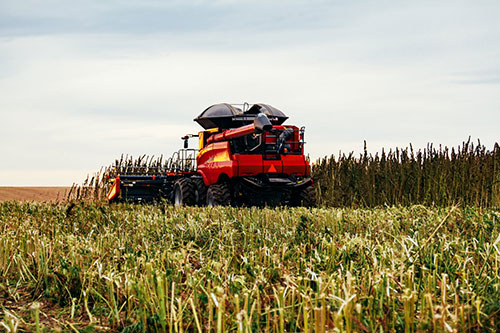
The 2018 Farm Bill includes new guidelines for growing hemp. It moves hemp under the Title 1 commodity program. Early this year, USDA issued a Notice to Trade, stating they are in the process of gathering information to initiate rule making necessary to implement this program.
The USDA’s goal is to issue regulations in fall 2019 to accommodate the 2020 planting season, the agency said in a recent release.
“During the 2019 planting season, the 2018 Farm Bill directs that states, tribes and institutions of higher education may continue operating under authorities of the 2014 Farm Bill until 12 months after USDA establishes the plan and regulations required under the 2018 Farm Bill,” they said in the release.
READ THIS – https://michiganhempindustries.com/mdard-industrial-hemp-ag-pilot-program-for-2019-planting-season/
[kl_posts posts_per_page=”10″ order=”desc”]

This event provides a good chance to network and learn more about the Michigan Hemp Industries as well as the current status and the future of hemp in Michigan and elsewhere.
Members and the public will be welcome to come and listen as we discuss the creation of a board and actions we will be taking and considering. This will also be a business meeting and only National Hemp Industries Association members, Farm Level and up, who reside in Michigan will have a voice and a vote for future actions in this Michigan Chapter.
Food and Drink for all will be served and there will be plenty of time to meet with and speak to others with similar interests in the hemp and CBD industry.
This meeting will give you a great insight to our developing hemp organization.
To Join the HIA (national organization) follow this link JOIN THE HIA. To have a voice and voting rights in the future in our organization you must have a National Hemp Industries Association membership..
To RSVP and Get on our Mailing List complete the Form at this Link Here ——> RSVP FORM. Keep Updated
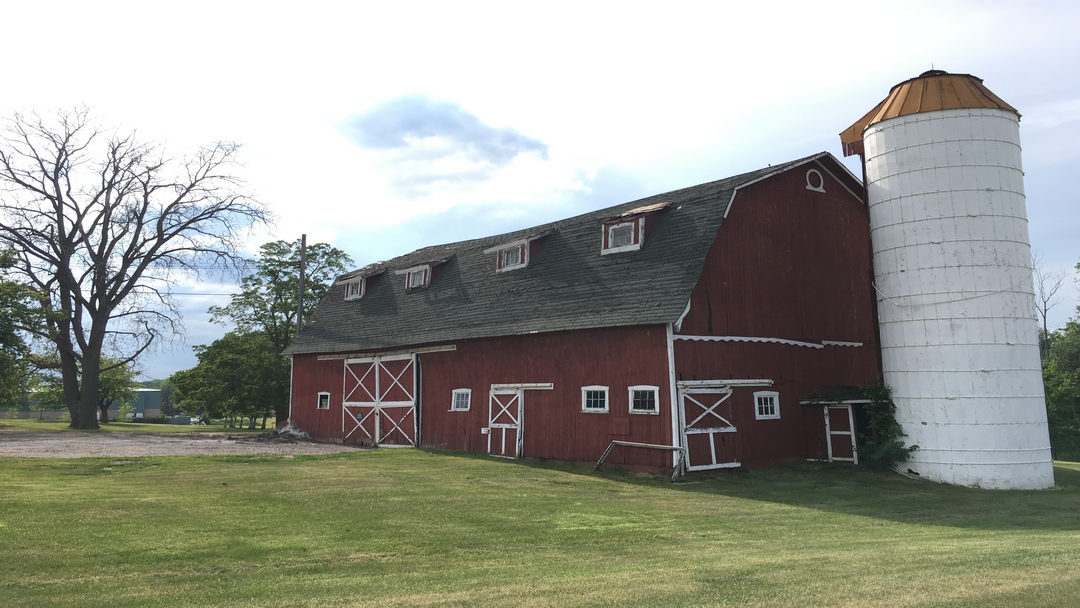
On April 18, 2019 – Governor Whitmer launched an Ag pilot program for farmers interested in farming hemp this year. Under the 2014 Farm Bill, this program is meant for research purposes.
“MICHIGAN IS UNIQUELY POSITIONED TO GROW, PROCESS AND MANUFACTURE INDUSTRIAL HEMP. WE ARE ONE OF THE NATION’S MOST AGRICULTURALLY DIVERSE STATES – GROWING 300 DIFFERENT COMMODITIES ON A COMMERCIAL BASIS – MAKING IT A NATURAL FIT,” SAID WHITMER. “THIS EMERGING CROP NOT ONLY CULTIVATES NEW OPPORTUNITY FOR OUR FARMING COMMUNITY, BUT IT ALSO CREATES AN AVENUE FOR NEW BUSINESSES TO CROP UP ACROSS THE STATE.”
Those interested should start the application process at The Michigan Department of Agriculture and Rural Development (MDARD).
MDARD will be holding a series of licensing events at the MSU Pavilion for Agriculture and Livestock Education in Lansing. These meetings will serve to facilitate expedited issuance of required licenses and research agreements during the following times:
Tuesday, April 23 8:30 am – 11:45 am, 1:00 pm – 4:00 pm
Wednesday, April 24 8:30 am – 11:45 am, 1:00 pm – 4:00 pm
Monday, April 29 8:30 am – 11:45 am, 1:00 pm – 4:00 pm
Tuesday, April 30 8:30 am – 11:45 am, 1:00 pm – 4:00 pm
Forms for a grower registration, a processor-handler license, and participation in MDARD’s 2019 Hemp Ag Pilot Program are now available online. The department will begin accepting applications on April 23, 2019. Grower registration costs $100 and a processor-handler license cost $1,350.
“MICHIGAN’S PILOT PROGRAM ALLOWS OUR FARMERS TO EXPLORE THE PRODUCTION AND PROCESSING FOR HEMP TO DETERMINE WHETHER OR NOT THIS IS A FINANCIALLY VIABLE CROP FOR THEM,” SAID GARY MCDOWELL, MDARD DIRECTOR. “IT ALSO HELPS PAVE THE WAY FOR MICHIGAN GROWERS AS WE MOVE TOWARD A PERMANENT LICENSING PROGRAM NEXT YEAR TO IDENTIFY AND EXPAND VALUE-ADDED HEMP PROCESSING AND NEW MARKET PROSPECTS.”
Komorn Law has associated our law firm expanding its cannabis and hemp industry services across the globe. If you are thinking about starting a business in this area you will need legal guidance and corporate counsel.
Contact our office to find out more information.
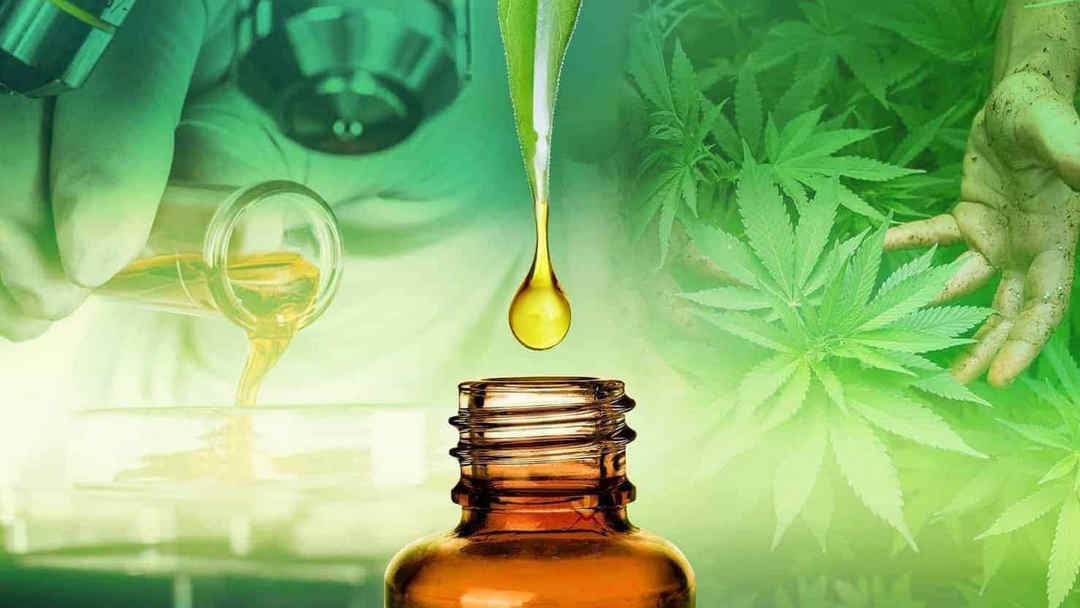
Michigan officials are informing citizens that food and drinks with CBD oil aren’t legal yet. CBD is the new thing in the health alternative market.
After Proposal 1 passed in Michigan which legalized adult-use marijuana and industrial hemp as well as the 2018 U.S. Farm Bill which legalized hemp nationwide there has been a rise of products made with CBD.
“The whole scheme is fascinating. It doesn’t make the subject matter into an illegality,” said Michael Komorn, a lawyer and president of the Michigan Medical Marijuana Association. “It’s a not a crime, it’s a regulatory fine. You won’t get arrested, but it may prevent you from getting a license to do that in the future.”
Michigan’s Department of Agriculture and Rural Development is waiting on the federal government to write its hemp program regulations before it comes up with its own rule set — and that won’t happen until 2020.
“It won’t be until 2020 until a state government can have a state plan for raising industrial hemp in their state,” said James Averill, deputy director for MDARD.
However, a mechanism in the 2014 Farm Bill that allows farmers to grow industrial hemp by working with universities or with state departments of agriculture — and Averill said Michigan is considering a way to help farmers plant hemp sooner rather than later.
“For putting seed in the ground this year — we have to work off the 2014 Farm Bill and that is a conversation that we’re continuing to have with the administration,” Averill said.
Previously, U.S. Drug Enforcement Administration requirements made the state’s direct involvement to authorize hemp farmers difficult. The 2018 Farm Bill changed that, Averill said.
Michigan Offers Guidance on CBD and Industrial Hemp
March 29, 2019 – The Bureau of Marijuana Regulation (BMR) and the Michigan Dept of Agriculture & Rural Development (MDARD) issued joint guidance today regarding CBD (cannabidiol) and industrial hemp.
From the Bureau of Marijuana Regulation:
From the Michigan Department of Agriculture and Rural Development:
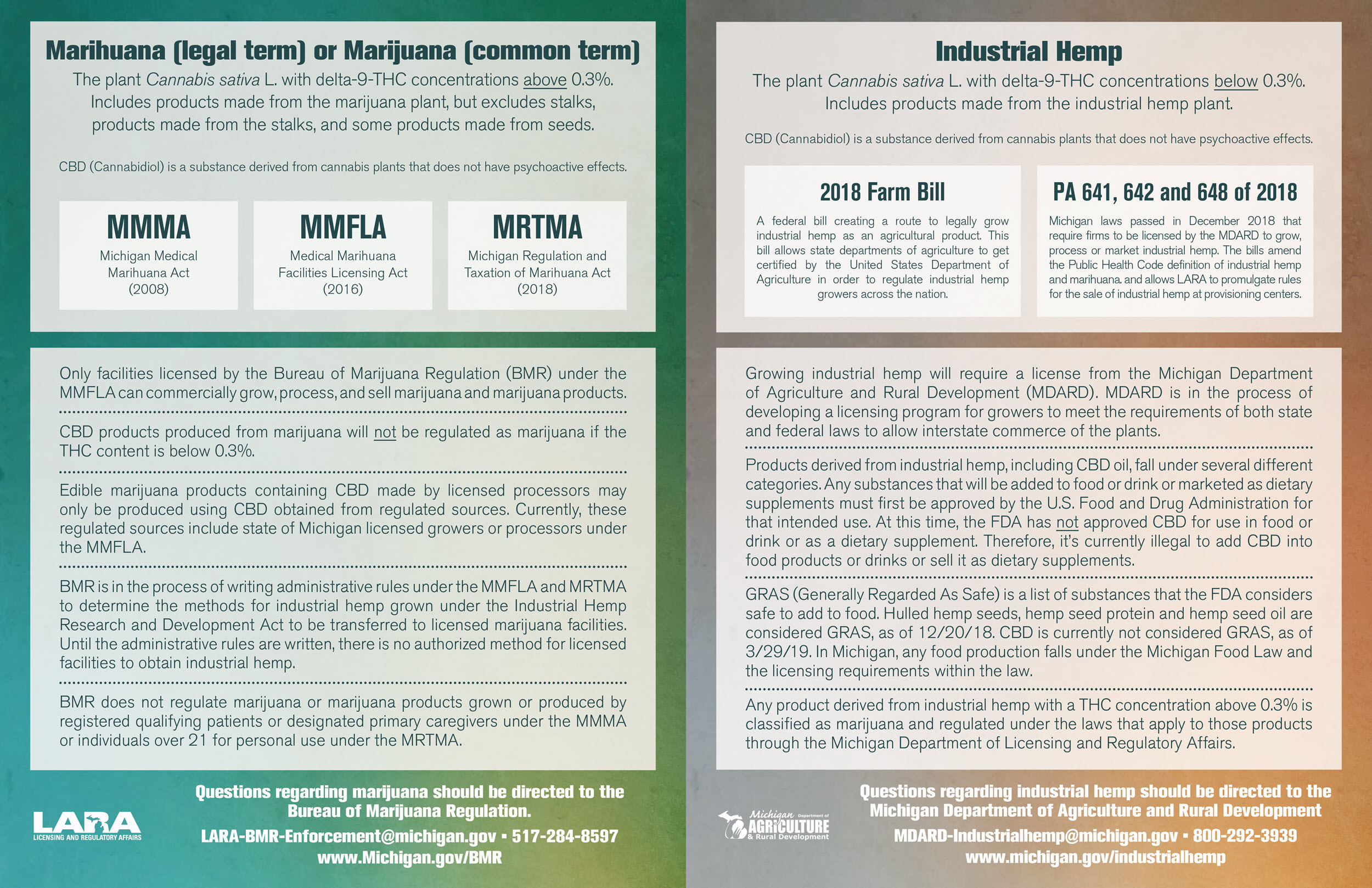


Definitions



Michigan officials are informing citizens that food and drinks with CBD oil aren’t legal yet. CBD is the new thing in the health alternative market.
After Proposal 1 passed in Michigan which legalized adult-use marijuana and industrial hemp as well as the 2018 U.S. Farm Bill which legalized hemp nationwide there has been a rise of products made with CBD.
“The whole scheme is fascinating. It doesn’t make the subject matter into an illegality,” said Michael Komorn, a lawyer and president of the Michigan Medical Marijuana Association. “It’s a not a crime, it’s a regulatory fine. You won’t get arrested, but it may prevent you from getting a license to do that in the future.”
Michigan’s Department of Agriculture and Rural Development is waiting on the federal government to write its hemp program regulations before it comes up with its own rule set — and that won’t happen until 2020.
“It won’t be until 2020 until a state government can have a state plan for raising industrial hemp in their state,” said James Averill, deputy director for MDARD.
However, a mechanism in the 2014 Farm Bill that allows farmers to grow industrial hemp by working with universities or with state departments of agriculture — and Averill said Michigan is considering a way to help farmers plant hemp sooner rather than later.
“For putting seed in the ground this year — we have to work off the 2014 Farm Bill and that is a conversation that we’re continuing to have with the administration,” Averill said.
Previously, U.S. Drug Enforcement Administration requirements made the state’s direct involvement to authorize hemp farmers difficult. The 2018 Farm Bill changed that, Averill said.
Michigan Offers Guidance on CBD and Industrial Hemp
March 29, 2019 – The Bureau of Marijuana Regulation (BMR) and the Michigan Dept of Agriculture & Rural Development (MDARD) issued joint guidance today regarding CBD (cannabidiol) and industrial hemp.
From the Bureau of Marijuana Regulation:
From the Michigan Department of Agriculture and Rural Development:



Definitions